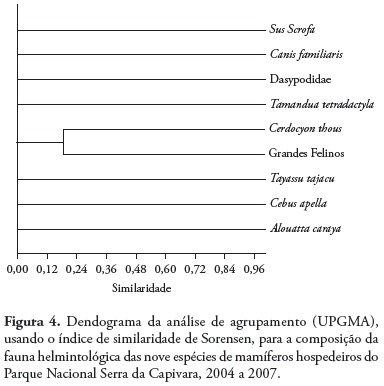Biodiversity studies allow ecosystem assessment and monitoring of environmental changes and impacts. Parasite diversity could reflect the host/ parasite coevolutionary process and the environment changes that permit the loss, gain or maintenance of species. This survey used species/morphotypes of helminths eggs found in feces from seven wild mammal species (the groups Dasypodidae and Large Cats, and Tamandua tetradactyla, Cebus apella, Alouatta caraya, Cerdocyon thous, Pecari tajacu) and from two domestic species (Canis familiaris and Sus scrofa), which occur within the Serra da Capivara National Park (PNSC) and surrounding areas in order to analise the diversity of mammal intestinal helminths. This work used the helminthological fauna findings of wild and domestic mammals, to consider a possible helminth flux between these two host groups using Unweighted Pair Group Method with Arithmetic Mean (UPGMA) of the hosts based on helminthological fauna composition. The results indicate that the region of the PNSC still maintains environmental conditions that still keep wild mammal helminthological fauna composition different from the one found for domestic mammals.
Helminths; helminths egg; Caatinga; Parque Nacional Serra da Capivara; mammals









